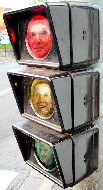 It???s about 4 hours after the polls have closed in a remarkable election in Germany. Probably for the first time in a few decades, it looks very hard to presently predict what is going to happen.
It???s about 4 hours after the polls have closed in a remarkable election in Germany. Probably for the first time in a few decades, it looks very hard to presently predict what is going to happen.
A quick summary of the results (roughly):
SPD ??? 33% (down 5%)
CDU ??? 35.3% (down 3%)
FDP ??? 10.3% (up 3%)
Greens ??? 8% (unchanged)
Die Linke/PDS ??? 8% (up 4%)
Translate this into seats in the Bundestag, and CDU-FDP has no majority, and neither does SPD-Greens. So what happens? A traffic light coalition is the best bet I think. But don’t expect any swift solutions to this one – the negotiations are sure to take quite some weeks.
A quick overview of what the parties might be thinking:
SPD ??? looks like a real victory. They have lost 5%, but the result very much exceeds their expectations. Schröder looks like a leader, and has been talking bullishly about the future. Note his strong comments about environmental protection in his speech, and a sound determination to build a coalition.
CDU ??? really feel they have been dealt a major blow. The body language at the party HQ said it all ??? they have seen a possibility of governing basically disappear. Merkel???s position has not been strong, and the bad result will not help her at all. Can she lead the party as it presently stands? The CDU share of the vote has only been lower twice in history ??? in 1949 and 1998. Is this someone who will give the country confidence?
FDP ??? the real success story, with a decent increase in vote. But these votes were gained mainly at the expense of the CDU. So their celebrations will be soured by the fact that the CDU-FDP coalition cannot happen. But surely they want to get their hands on power?
Greens ??? a decent result for them. Holding their vote steady shows their parts of the government programme may be respected. Fischer???s speech was optimistic and determined.
Die Linke/PDS ??? winners for sure, making it clearly into the Bundestag. But no-one wants to really go near them, and Schröder was very dismissive of them in his speech, and of Lafontaine in particular.
So what does this mean for coalitions?
SPD-CDU grand coalition: would secure the largest majority, and is the only 2 party coalition that would have any majority. But the CDU would be slightly the largest party, and would a Merkel-SPD combination in the current climate be possible? Would a partially rejuvenated SPD want to deal with a CDU that looks at a low ebb? And what are the CDU???s policies, and who is really in charge? Merkel???s speech did little to inspire confidence.
Jamaica-coalition: CDU-FDP-Greens (Black-Yellow-Green, hence Jamaica!). Very unlikely as it has never in the past been tried, and the leadership of none of the three parties would really want it. Fischer has said he does not want to deal with the CDU.
So, with neither of these options likely, what about choices without the CDU in them?
Traffic-light coalition: SPD-FDP-Greens would seem a more sensible fit. SPD and the Greens have shown well that they can manage to get along. Schöoder has shown renewed commitment to environmental matters during this campaign. The FDP ??? having gained a lot in this election ??? would for sure prize a place in power, and the traffic light coalition might be the best way to achieve this. Having the FDP on board could assist the SPD in getting their reform plans through the Bundestag, and agreement might be possible on the environmental matters that the FDP oppose. In terms of the current dynamics of the parties, this option would be the best and most viable in my mind.
A SPD-Green government, relying on support of Die Linke/PDS might have been a possibility some time ago, but this would severly limit the scope for economic reform.
Let???s see what happens, but this election is for sure not an overall defeat for the centre left ??? far from it. So pin hopes on a traffic light coalition!







